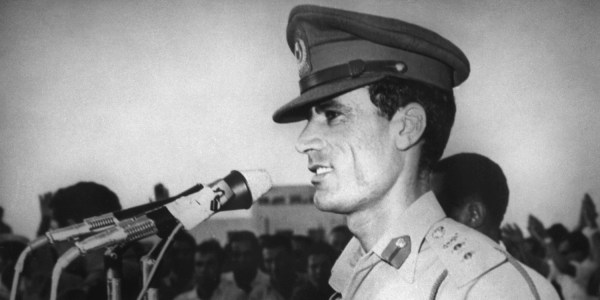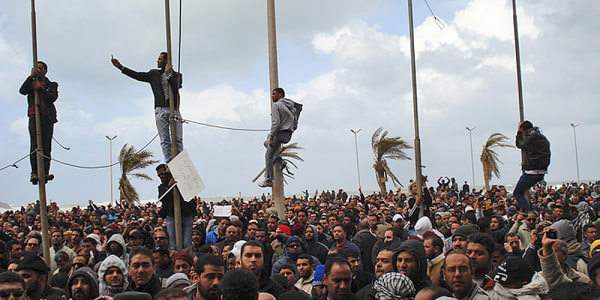The U.N. Security Council on Thursday authorized "all necessary measures" including strikes by air and sea to protect civilians from attacks by Moammar Gadhafi's forces.
The no-fly zone resolution passed 10-0 with five abstentions, including Russia and China, which have veto power, and Germany, India and Brazil.
It was unclear when the West would take action.
President Barack Obama spoke with French President Nicolas Sarkozy and British Prime Minister David Cameron on Thursday night, the White House said. The three agreed Libya must immediately comply with all terms of the U.N. resolution.
The resolution establishes “a ban on all flights in the airspace of the Libyan Arab Jamahiriya" while excluding an occupation force. It also calls for freezing the assets of the Libyan National Oil Corp. and the central bank because of links to Gadhafi.
A British lawmaker said British forces could be mobilized as early as Thursday night. U.S. officials, speaking after a closed-door briefing in Congress, said they expected an attempt to ground Gadhafi's air force could begin by Sunday or Monday and would probably involve jet fighters, bombers and surveillance aircraft.
Cameron called a cabinet meeting for Friday and will also make a statement to parliament on Libya, a spokeswoman said.
The U.N. resolution reflected the past week's swift reversal of the situation in Libya, where once-confident rebels are now in danger of being obliterated by an overpowering pro-Gadhafi force using rockets, artillery, tanks, warplanes. That force has advanced along the Mediterranean coast aiming to recapture the rebel-held eastern half of Libya.
However, after the vote, Libyan Deputy Foreign Minister Khalid Kaim in Tripoli took a conciliatory tone, offering to negotiate a cease-fire with the rebels. He welcomed the Security Council's endorsement of the territorial unity of Libya and concern for its citizens, but called on the world not to allow them to receive weapons because "if any countries do that, they will be inviting Libyans to kill each other."
French Foreign Minister Alain Juppe flew to New York Thursday to press the case for speedy Security Council approval.
The world is "living one of its great revolutions that changes the course of history," Juppe told the Security Council just before the vote.
Thousands of anti-Gadhafi protesters in Benghazi watched the U.N. proceeding on an outdoor TV projector and celebrated the vote by firing guns in the air, setting off fireworks and waving flags from the monarchy era in celebration, Al Jazeera TV showed.
Earlier, French Prime Minister Francois Fillon said on France-2 Television that "time is of the essence" and that France would support military action against Gadhafi within a matter of hours if the Security Council approves the resolution.
No ground operation
Military action could include France, Britain, possibly the United States and one or more Arab states, the French diplomatic sources said. The United States already has warships positioned near Libya.
The French official, speaking on condition of anonymity because he was not authorized to speak about the issue publicly, said France foresees a "coalition of the willing" that would include support from Arab states but would not involve a ground operation.
Arab countries' support could come, for example, by providing use of their air bases, the official said.
Italy said it would make its military bases available to enforce the no-fly zone, government officials said.
Canada will contribute six CF-18 fighter jets to help enforce a Libya no-fly zone, sources told CTV News.
German Foreign Minister Guido Westerwelle said his nation's troops would not take part in Libyan military operations but he still believes Gadhafi must stop his war against his own people.
Support for the resolution marked a dramatic about-face by the Obama administration, which for weeks hesitated about supporting a no-fly zone, fearing that the United States could get sucked into another war in a Muslim nation.
The United States would likely use bombers and fighter planes, possibly including F-16s, F-15s and F-22s, to strike ground targets, U.S. Air Force Chief of Staff General Norton Schwartz has said.
Congressional officials Thursday said the Obama administration is readying plans to participate in a no-fly zone with the help of Arab countries including Jordan, Qatar and the United Arab Emirates.
The participant list was designed to demonstrate that the effort to aid anti-Gadhafi rebels had support from other countries in the region.
Warning from Libya
In an interview broadcast just before the Security Council voted, Gadhafi dismissed its actions. "The U.N. Security Council has no mandate. We don't acknowledge their resolutions," he told the Portuguese public Radiotelevisao Portuguesa. He pledged to respond harshly to U.N.-sponsored attacks. "If the world is crazy, we will be crazy too," he said.
Earlier, Gadhafi told Benghazi residents in a radio speech, "We will come zenga, zenga. House by house, room by room."
"We are coming tonight" and "there won't be any mercy" for enemies.
Unarmed residents have nothing to fear, but every home will be searched, he said.
"Anyone who will throw away his weapon and stay home will get amnesty," Gadhafi said. "Whoever has a weapon in his apartment is considered one of the enemy."
Gadhafi spoke as his forces approached Benghazi and his warplanes bombarded the rebel stronghold's airport, threatening an all-out offensive to bring down the rebellion.
Rebel forces vowed to stand firm.
"We will not be intimidated by these lies and claims," Libyan National Council head Mustafa Abdel Jalil said, Al Jazeera television reported. "Libyan cities from Ajdabiyah and all of the east are under rebel control."
Abdel Jalil said he would welcome any step that stopped "genocide," including the U.N. resolution .
Libya warned of dire consequences for civilian and military targets and traffic in the Mediterranean Sea if any foreign nations attack.
Libya's Defense Ministry said in a statement broadcast on state television that any foreign attack will endanger air and maritime traffic in the Mediterranean basin and expose the area to both short and long term risks.
Slideshow 34 photos
Moammar Gadhafi
The statement said Libya would strike back at civilian and foreign targets if the country comes under attack from foreign forces.
"Any foreign military act against Libya will expose all air and maritime traffic in the Mediterranean Sea to danger and civilian and military (facilities) will become targets of Libya's counter-attack," said the statement.
"The Mediterranean basin will face danger not just in the short-term, but also in the long-term," it said.
Appeal for aidThe Libyan opposition has appealed for immediate assistance to prevent the rebel capital of Benghazi from falling to forces loyal to Gadhafi, and the question facing President Barack Obama and other world leaders was whether the action they planned to take would come in time.
U.S. Secretary of State Hillary Clinton said Thursday in Tunisia that the international community "is debating how best to prevent Gadhafi from overrunning the opposition and killing many more innocent people."
"A no-fly zone requires certain actions taken to protect the planes and the pilots, including bombing targets like the Libyan defense systems," Clinton said as she neared the end of a Middle East trip dominated by worries about Libya.
Asked if Arab nations would have to take part by providing pilots or by bombing or otherwise being directly involved in carrying out any eventual military operation against Gadhafi, Clinton replied: "That is also being discussed."
Speaking on a Tunisian television program, Clinton said if Gadhafi — whom the United States long branded a terrorist and held responsible for the 1988 Lockerbie bombing and other violent acts — stayed in power, everyone would suffer.
"Tunisia knows very well that if Gadhafi does not go, he will most likely cause trouble for you, for Egypt and for everybody else," she said. "That is just his nature. You know, there are some creatures that are like that."
Benghazi fighting
Witnesses reported that rebels in Benghazi succeeded in shooting down at least two pro-Gadhafi warplanes that were bombing the city's Benina Airport. Mohammed Abdel-Rahman, a 42-year-old merchant who lives nearby, said he saw one of the warplanes shot down after striking Benina — a civilian and military air facility about 12 miles (20 kilometers) from the center of the city. He said the strikes caused light damage.
Another witness, medical official Qassem al-Shibli, told The Associated Press that he saw three planes attack the airport and nearby rebel military camps before two were shot down. A third witness saw fire trucks fighting a blaze at the airport, and black smoke billowing from the area.
At the same time, the rebels were sending their own warplanes in an attempt to break the regime's assault on Ajdabiya, a city about 100 miles (150 kilometers) southwest of Benghazi that has been under a punishing siege by Gadhafi's forces the past two days. Three rebel warplanes and helicopters struck government troops massed at Ajdabiya's western gates, said Mustafa Gheriani, a spokesman in Benghazi, and Abdel-Bari Zwei, an opposition activist in Ajdabiya.
But by Thursday afternoon, Gadhafi's army were holding the southern, eastern and western outskirts of Ajdabiya. Further outflanking the rebels, troops landing from sea swept into the nearby Mediterranean port town of Zwitina, 15 miles (25 kilometers) north, between Ajdabiya and Benghazi.
Ajdabiya is the first rebel-held city in the east that Gadhafi troops have tried to recapture, heavily bombarding it since Tuesday, with rockets and shells raining down on residential areas, according to witnesses. Most of the non-male population has fled. At least 30 people have been killed and 80 wounded since the siege began, according to an official at the hospital. He said medicines were running out and that electricity in the city was off and on. That may be in part from rebels themselves, who have shut off power at night to hide their movements.
Slideshow 81 photos
Libya's uprising against Gadhafi
Fierce battles erupted between rebels and government troops at the city's southern gates in the pre-dawn hours Thursday, said Zwei. He and other residents told AP that Gadhafi forces were remaining on the city outskirts, occasionally clashing and bombarding but still not able — or trying — to moving into the center where rebel fighters were dug in.
Zwei said the forces may be trying to tie down rebels in Ajdabiya while other troops go around the city to assault Benghazi.
Benghazi, Libya's second largest city with a population of more than 700,000, was gearing up for the defense.
Gheriani, the opposition spokesman, told AP the city was "armed to the teeth" and the opposition is ready to defend it. Young men were volunteering for basic military training with army units allied to the rebellion, said one resident, speaking on condition of anonymity for fear of future persecution by Gadhafi's regime.
More checkpoints were popping up at intersections and on main roads, manned by men in uniform armed with AK-47s and backed by anti-aircraft guns mounted on pickup trucks, in the city, 620 miles (1,000 kilometers) east of Tripoli along the Mediterranean coast. The Red Cross said it was leaving Benghazi because of deteriorating security and moving to the city of Tobruk, further east.
In western Libya, Gadhafi forces were besieging Misrata, Libya's third largest city, 125 miles (200 kilometers) southeast of Tripoli. The previous night, they launched a heavy assault that doctors at the city hospital said left 18 dead, according to Mokhtar Ali, an opposition figure in exile outside Libya who was in touch with relatives in the city.
Gheriani said by telephone from Benghazi that the opposition was hoping for a positive U.N. Security Council vote but "if not, we'll rely on ourselves and do what we can."
Western military action against Gadhafi's forces could dramatically change the balance of power on the ground.

